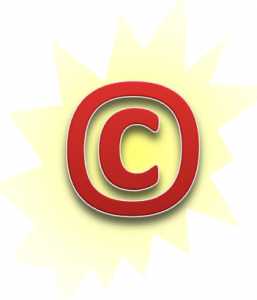Sure, I know, you’re an author and you don’t want to have to bother with all that legal stuff like copyrighting. You just want to write. You don’t understand that funny little symbol (©), and you hate that your word processor comes up with it when you type (c). You’ve landed at the right blog post. I’ll make this easy.
 First the necessary disclaimer. I’m no lawyer, let alone a copyright attorney. For the best legal advice, hire or befriend one of them.
First the necessary disclaimer. I’m no lawyer, let alone a copyright attorney. For the best legal advice, hire or befriend one of them.
Definition time. What’s a copyright? It’s a granting to you by the government of exclusive legal rights to the distribution and use of the story you wrote, for a set period of time. The rationale for copyrights is to forge a compromise between two desirable goals: (1) writers should get paid for their creative effort, and (2) eventually, all creative works should be shared without restriction for the betterment of humanity.
This blog post covers copyrights of short stories in the United States only. For other intellectual property and for the laws in other countries, you’ll have to search elsewhere.
Here’s the stuff you need to know:
- If you wrote the story yourself and didn’t copy someone else’s, and if you have finished it in some fixed form, it’s already copyrighted. Automatically. (The only known case where lawyers and the government made things easy for you.)
- Your copyright gives you the following rights and denies them to others. You can copy it, distribute it, perform it, display it, and create derivative works like sequels or adaptations in other forms.
- Your copyright is effective immediately and will expire seventy (70) years after your death, at the end of that calendar year. That’s according to current law, but they change it every now and then.
- Since you wrote your story after 1989, you don’t need to add the copyright symbol, though you may do so if it makes you feel better. The format is: Symbol (©), year, your name. (Example: © 2014 Steven R. Southard)
- You also don’t need to register your copyright. If you decide to do so, (with the U.S. Electronic Copyright Office), then things are a bit easier for you if someone steals your story. You won’t have to prove it’s yours, and I understand you can sue for greater amounts. But there are fees for registration.
- If you’ve heard about mailing your story to yourself and using the postmark as an official way to establish the date of your story, forget it. That so-called “poor man’s copyright” doesn’t give you any more protection than you had before mailing, and it isn’t a substitute for registering a copyright.
- When you sign a contract with a publisher, you’re selling some of your story rights to that publishing company in exchange for payment. If you’re just starting out, these contracts are pretty standard. Once you become more experienced, you can negotiate which rights you want to retain.
- If you post your story on the internet, you may be giving up some or all of your copyright protections. (If that’s your intent, good!) The site on which you post the story will have user agreements that specify the rights you’re granting them by posting there.
That’s it. If you’re feeling more like a lawyer than a writer now, I suggest you burn any briefcases or suits you might have, and take a warm shower with vigorous application of soap and water to get the lawyerly residue off. That’s what’s next in store for—
Poseidon’s Scribe
